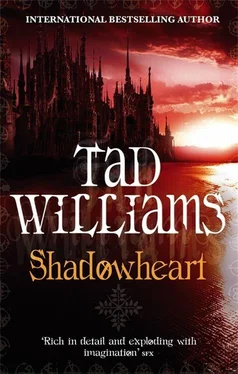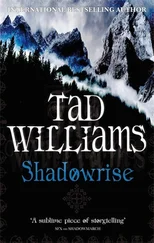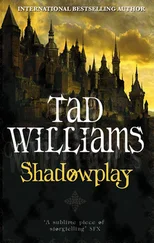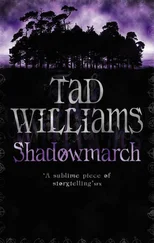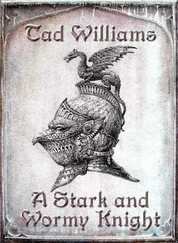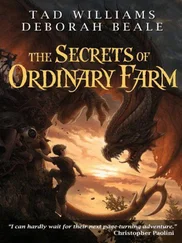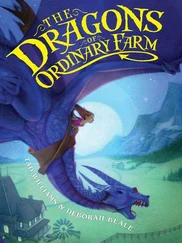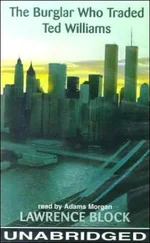“… But in those days the Kracian hills were a fierce, lawless place. A clan of bandits came into the valley where Adis and his parents lived while he was out with the flock, and they killed his parents and took what little the family had.”
—from
“A Child’s Book of the Orphan, and His Life and Death and Reward in Heaven”
“I am weary and heartsick,” said Olin Eddon. “Why must I remain here? I have seen the ships roll in, seen the soldiers in their thousands disembark. Yes, the autarch has ample might to humble my poor country. What purpose does this serve?”
Pinimmon Vash looked up to the deck of this latest, largest supply ship. The chief of the cargo-men waved a signal, letting the paramount minister know that the show was about to start. Other ships were unloading as well—the harbor that had once served mainland Southmarch was now the hub of the autarch’s tent-city along the shore of the bay—but it was this one that was the object of the autarch’s greatest interest.
“It was the Golden One himself who decreed that you must watch from here, King Olin,” Vash said as politely as he could. “That is all you need to know.”
“Why is no one in Southmarch firing on your ships?” Olin’s face was pale and damp with perspiration. “Surely not even Tolly would fail to defend his own castle. What trick has your master played to land here unopposed?”
“Ask the Golden One about such minor matters, King Olin, not me.” Couldn’t the northerner see that all this had nothing to do with Pinimmon Vash himself, that he was only doing what his master required of him? The foreign king was less of a savage than Vash had expected, but his manners were clearly not up to the rigorous standards of a real court. After all, wasn’t having to stand here on the sunny waterfront without even a parasol—where were those cursed slave boys, anyway?—much harder on the older, more delicate Vash?
He became uncomfortably aware that King Olin was staring at him. “Yes?”
“You seem like a civilized man, Lord Vash,” said Olin, weirdly mirroring Vash’s private thoughts. “An intelligent man. How can you do the bidding of someone like the autarch? He has said—if he is not completely mad, of course, if what he plans can actually be done—he has said he intends to bind up the power of a true god so that everything that lives on the earth will be his slaves!”
Vash almost smiled at that, but he had not lost all caution: he quickly looked around to make certain they were alone before answering. “And how is that different from what we have now, King Olin? The Golden One already rules absolutely, so what else can I do but comply? No, your question is naïve, I fear. You might just as easily—and just as fruitfully—ask me why a stone falls to the ground when dropped or why the stars hang shining in the sky. That is how Creation is ordered. Only a fool would give up his life when there is no hope things will ever be otherwise.”
Olin Eddon didn’t appear offended, but neither did he seem convinced. “Then no tyrant in history would ever have been overthrown. The Twelve would not have cast down the dictator Skollas, and Hierosol would have crushed Xis a thousand and more years ago.”
“If the gods willed it, so it would have been,” agreed Vash. “But I see no such truth in the world we inhabit here, today. The autarch rules us, may he live forever—all else is but an airy game of what-might-be.”
Olin continued to stare at him, intently enough that Vash began to feel quite put out. Didn’t this northern upstart realize what an honor was being done to him, having the paramount minister of all Xis as his attendant? “You really should pay attention to the unloading, King Olin. It was the Golden One’s express wish. ...”
Olin ignored him. “Not all southerners are as fatalistic as you, Lord Vash. I know many of your continent who fought back against the autarch—one in particular who became my friend.”
Pinimmon Vash could not help laughing a little. “And what did it gain him? Not much, I imagine.” A thought suddenly came to him. “Hold a moment. Do you talk about the traitor, Shaso dan-Heza? The Tuani general who tried to thwart the rightful claims of Autarch Parnad, the Golden One’s father?”
Now it was Olin’s turn to smile, a wolfish grin deep in his gray-shot beard. “Rightful claims? Now who is being purposefully naïve? Shaso and his people fought Parnad and Parnad’s father, too, and even though I hear a puppet of sorts has been put on the throne in Nyoru, I imagine some in Tuan will continue fighting until one day they drive you Xixians out. The Tuani are no cowards and they clearly do not agree that the autarch’s rule over all the world is inevitable.”
Again, Vash was nettled by this upstart king. “And your friend, the traitor Shaso? This mighty bulwark against tyranny? Where is he today?”
Olin’s expression grew dark. “I do not know. Nor would I tell you if I did, of course.”
“Of course. Now, enough of such contentious matters.” Vash shook back his long sleeves and gestured to the gang ramp leading down from one of the larger cargo ships onto the mainland harbor’s biggest loading dock. “Look. This is what the autarch most particularly wanted you to see.”
Even many of the Xixian sailors on the dock and the soldiers on the beach had wandered over to watch as a group of large, awkward, man-shaped things made their way down the ramp. Each had two arms and two legs, but there the resemblance ended. Their stocky legs and short arms were covered in bony plates, with stiff bristles growing between them and up the creatures’ backs. Their hands looked more like the digging-claws of moles, proportionately large and covered with leathery, warted flesh. But it was their torsos and heads that dragged at the eye: they had strange armored midsections, as if they were upright beetles or tortoises, and these rose up in the front to cover their necks and the bottoms of their heads from below, just as a continuation of their back armor curled down over the tops of their heads, so that all that could be seen of their faces were eyes peering out of the shadows between the unjoined pieces of bony shell, as if they were giant oysters or armored men wearing absurdly large helmets. But for all their defenses, the weird things seemed ill—they halted for no reason, or stumbled as they walked. One fell and could not rise, legs kicking slowly in the bright sunlight.
“These things ...” Olin said, blinking, “they are monsters. Did you do this to them?”
“Vash did nothing!” said a voice behind them, floating down from above as if a god had spoken. Which, in a way, one had, since the voice was the autarch’s, who was coming toward them across the sand on his ceremonial platform carried by slaves, as though he were himself some breed of giant, many-legged creature. “In fact, these splendid creations were first bred in my great-grandfather Aylan’s day.”
“So madness runs in the blood of your family,” said Olin in disgust.
“Something you and I have in common, eh?” Sulepis grinned. “These creatures were of the Yisti once, who are the same blood as your northern Funderlings, although this breed, the Khau-Yisti, were larger and more savage, wild diggers where their Yisti cousins were almost as civilized as men.” He spoke with the air of one who tries to impart an interesting lesson to a dull student. “My great-grandfather’s breeders captured the wild tribes, took the largest and strongest of them and began to shape them to work the mines of the Xan-Horem Mountains, dangerous places where the earth often collapses. These Khau-Yisti, though, are strong and stolid, and they can dig their own way out after a cave-in—a most thrifty sort of worker to have.” He frowned, watching the creatures struggling down the gangplank. “Traveling does not seem to agree with them, or perhaps it is your chilly northern air. Many died during the voyage, and these do not look to last much longer. ...”
Читать дальше
